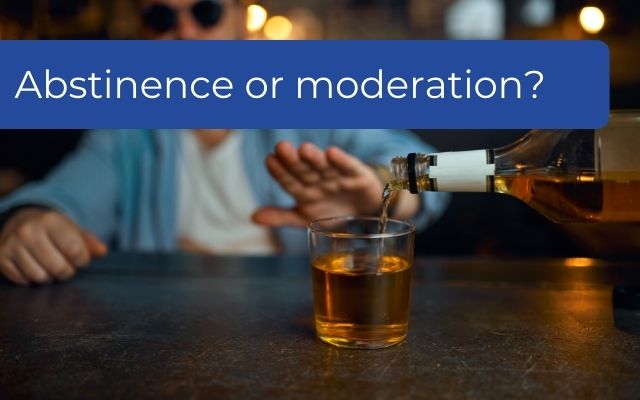
We’ve all heard the saying “everything in moderation,” and that can definitely apply to alcohol. But when it comes to your health, is a moderate amount of alcohol actually good for you, or is it better to abstain altogether? This can be a confusing question, and the answer might be different for everyone.
In this article, we’ll explore: Alcohol Moderation or Abstinence and the pros and cons of both alcohol moderation and abstinence. We’ll also talk about the health risks associated with excessive alcohol consumption, and how to identify if you might have a problem with alcohol.
Also Read: Forest Bathing And Nature Therapy: What It Is and Where to Do It
Understanding Alcohol’s Effects on Your Body
First things first, let’s get a basic understanding of how alcohol affects your body. When you drink alcohol, it enters your bloodstream and travels throughout your body. It impacts different organs, including your brain, liver, heart, and stomach.
Here’s a quick rundown:
- Brain: Alcohol disrupts communication between brain cells, which can lead to problems with coordination, judgment, and memory.
- Liver: The liver is responsible for breaking down alcohol. Heavy drinking can damage the liver and lead to serious health problems like cirrhosis.
- Heart: Excessive alcohol consumption can increase your risk of heart disease, stroke, and high blood pressure.
- Stomach: Alcohol can irritate the stomach lining and contribute to stomach ulcers.
Alcohol moderation or Abstinence? Finding the Right Choice For You!
There have been individual pros and cons of both alcohol moderation or abstinence are explained below:


The Case for Moderation: Can Some Alcohol Be Beneficial?
Some research suggests that moderate alcohol consumption might have some health benefits, particularly for heart health. However, it’s important to remember that these benefits are relatively small, and there’s no guarantee you’ll experience them.
Here are some key things to consider about moderation:
- What is “moderate” drinking? For most healthy adults, moderate drinking is defined as one drink per day for women and two drinks per day for men. (Keep in mind, a “drink” can vary depending on the type of alcohol).
- Benefits are not guaranteed: The potential health benefits of moderate alcohol consumption are not a given. Factors like your overall health, genetics, and lifestyle can all play a role.
- Alternative ways to improve your health: Many other lifestyle habits, like exercising regularly and eating a healthy diet, have proven health benefits.


The Case for Abstinence: Why Some People Choose Not to Drink
There are many reasons why someone might choose to abstain from alcohol altogether. Here are a few:
- Health concerns: People with certain medical conditions, or who are taking certain medications, might be advised to avoid alcohol completely.
- Family history of addiction: If you have a family history of alcoholism, you might be more at risk of developing a problem yourself.
- Religious beliefs: Some religions prohibit alcohol consumption.
- Personal preference: Many people simply don’t enjoy the taste of alcohol, or prefer to avoid the potential downsides.


The Dangers of Excessive Alcohol Consumption
Excessive alcohol consumption can have serious consequences for your health. These include:
- Liver damage: As mentioned earlier, heavy drinking can damage the liver and lead to cirrhosis, a life-threatening condition.
- Heart disease: Excessive alcohol consumption can increase your risk of heart disease, stroke, and high blood pressure.
- Cancer: Heavy drinking is linked to an increased risk of certain cancers, including mouth, throat, liver, and breast cancer.
- Mental health problems: Alcohol can worsen symptoms of depression and anxiety.
- Accidents and injuries: Drinking alcohol can impair your judgment and coordination, increasing the risk of accidents and injuries.

Also Read: 7 Effective Strategies For A Digital Detox: A Comprehensive Guide
How to Know if You Have a Problem with Alcohol?
If you’re concerned about your drinking habits, here are some signs that you might have a problem:
- You can’t control your drinking: If you find it difficult to limit your alcohol intake or stop drinking once you start.
- You drink to cope with stress or emotions: If you rely on alcohol to deal with difficult emotions or situations.
- Alcohol is causing problems in your life: If your drinking is causing problems with your relationships, work, or health.
If you think you might have a problem with alcohol, there’s help available. Here are some resources:
- The National Institute on Alcohol Abuse and Alcoholism (NIAAA): https://www.niaaa.nih.gov/
- The National Council on Alcoholism and Drug Dependence (NCADD): https://recovered.org/
- The Substance Abuse and Mental Health Services Administration (SAMHSA):
Final Thoughts: Finding Your Balance
Ultimately, the decision of whether to moderate alcohol consumption or abstain completely is a personal one. There’s no right or wrong answer, and the best choice for you will depend on your individual health, lifestyle, and preferences.
Here are some key takeaways to consider:
- Be honest with yourself: Evaluate your relationship with alcohol. Do you drink to relax, socialize, or cope with stress?
- Talk to your doctor: Discuss your alcohol consumption with your doctor, especially if you have any health concerns.
- Focus on a healthy lifestyle: Regardless of your decision on alcohol, prioritize healthy habits like a balanced diet, regular exercise, and getting enough sleep.
- There’s no shame in seeking help: If you’re struggling with alcohol dependence, there are resources available to support you. Don’t hesitate to reach out for help.
Remember, a healthy lifestyle doesn’t have to be all or nothing. You can find a balance that works for you, and prioritize your overall well-being.
Here are some additional resources that you might find helpful:
- Understanding Your Drinking: https://www.niaaa.nih.gov/
- Alcohol and Your Health: https://www.cdc.gov/alcohol/index.html
- Rethinking Drinking: https://rethinkingdrinking.niaaa.nih.gov/
I hope this information empowers you to make informed choices about your health and well-being!
FAQs: Alcohol Moderation or Abstinence? Finding the Right Choice for You
- What exactly is considered “moderate” alcohol consumption?
Moderate drinking guidelines set by the National Institute on Alcohol Abuse and Alcoholism (NIAAA) define it as:
- Up to 1 drink per day for women: This translates to 12 ounces of beer, 5 ounces of wine, or 1.5 ounces of distilled spirits (like vodka or whiskey).
- Up to 2 drinks per day for men: This translates to 24 ounces of beer, 10 ounces of wine, or 3 ounces of distilled spirits.
It’s important to remember:
- These are just general guidelines. Factors like your body size, metabolism, and overall health can influence how alcohol affects you.
- “One drink” can vary depending on the type and alcohol content of the beverage. Always check labels for serving sizes.
- These guidelines are for healthy adults. Pregnant women, people taking certain medications, or those with certain health conditions should avoid alcohol altogether, or consult their doctor for specific advice.
- If I choose moderation, are there specific times I shouldn’t drink?
While you can find a healthy balance with moderation, there are definitely times to avoid alcohol altogether. Here are a few examples:
- If you’re pregnant or breastfeeding: Alcohol can harm your developing baby.
- If you’re taking certain medications: Alcohol can interact with some medications, so it’s important to talk to your doctor before drinking.
- If you’re driving or operating machinery: Alcohol impairs your judgment and coordination, increasing the risk of accidents.
- If you’re struggling with managing your drinking: If you find it difficult to stick to moderate amounts, it might be best to avoid alcohol altogether.
- I don’t enjoy the taste of alcohol, but feel pressure to drink socially. What can I do?
It’s perfectly okay not to drink alcohol! Here are some tips for navigating social situations:
- Be upfront and honest: Let your friends or colleagues know you prefer not to drink. A simple “I’m not drinking tonight” is perfectly acceptable.
- Offer alternatives: Bring your own non-alcoholic beverage to enjoy, or ask for a mocktail at a restaurant.
- Focus on conversation and connection: Social interactions don’t have to revolve around alcohol.
- Find your tribe: Connect with people who share your values and don’t pressure you to drink.
- I’m worried I might have a problem with alcohol. What are some signs to look for?
Here are some red flags that might indicate a problem with alcohol:
- You can’t control your drinking: If you find it difficult to limit your intake or stop once you start.
- You drink to cope with stress or emotions: If you rely on alcohol to deal with difficult feelings.
- Alcohol is causing problems in your life: If your drinking is negatively impacting your relationships, work, health, or finances.
- You hide or deny your drinking: If you feel the need to lie about how much you drink.
- You experience withdrawal symptoms when you stop drinking: These can include sweating, anxiety, or tremors.
- If I think I have a problem with alcohol, what resources are available to help me?
If you’re struggling with alcohol dependence, there’s no shame in seeking help. Here are some resources that can support you:
- The National Institute on Alcohol Abuse and Alcoholism (NIAAA): https://www.niaaa.nih.gov/ offers a wealth of information and resources on alcohol abuse and alcoholism.
- The National Council on Alcoholism and Drug Dependence (NCADD): https://recovered.org/ provides support groups, treatment referrals, and educational resources.
- The Substance Abuse and Mental Health Services Administration (SAMHSA): https://www.samhsa.gov/ is a government agency that provides a national helpline (1-800-662-HELP) for treatment referrals and information on substance abuse.
- Isn’t some red wine good for your heart?
Some research suggests that moderate red wine consumption might have some heart health benefits. However, it’s important to remember:
- The potential benefits are relatively small, and there’s no guarantee you’ll experience them.
- There are many other lifestyle habits, like exercise and a healthy diet, that have proven benefits for heart health.
- I’m pregnant. How can I avoid secondhand effects of alcohol?
If you’re pregnant, it’s crucial to avoid alcohol altogether. Even small amounts can harm your developing baby. Here’s how to minimize secondhand exposure:
- Be open with friends and family: Let them know you’re pregnant and kindly request they avoid drinking around you, especially while socializing.
- Choose smoke-free environments: Secondhand smoke can also be harmful during pregnancy, so avoid situations where people are smoking and drinking.
- Listen to your body: If you’re unsure about a situation, it’s always best to err on the side of caution and politely excuse yourself.
- I’m concerned about a friend or family member’s drinking habits. What can I do?
It can be difficult to approach someone about their drinking. Here are some tips:
- Choose a private and calm moment: Avoid accusatory language and focus on expressing your concern for their well-being.
- Focus on specific behaviors: Instead of saying “you drink too much,” mention specific instances where their drinking caused you concern.
- Offer support, not ultimatums: Let them know you care and are there to support them if they’re ready to get help.
- Educate yourself about resources: Familiarize yourself with treatment options and support groups you can share with them.
- Isn’t quitting alcohol cold turkey dangerous?
Suddenly stopping alcohol consumption after heavy or prolonged use can be dangerous and lead to withdrawal symptoms. If you’re concerned about your drinking, it’s important to seek professional help.
A doctor or addiction specialist can develop a safe and personalized plan for detox and treatment. This might involve gradually tapering off alcohol intake, medication-assisted treatment, and therapy.
- Will I have to give up everything I enjoy if I stop drinking?
Absolutely not! There are many ways to have fun and socialize without alcohol. Here are some ideas:
- Explore non-alcoholic beverages: Many delicious and sophisticated mocktails and non-alcoholic beers are available.
- Focus on activities: Plan social outings that revolve around shared interests, like attending concerts, going on hikes, or playing games.
- Find a supportive community: Connect with others who choose not to drink or are in recovery. Support groups and online communities can offer encouragement and connection.
Remember, choosing to abstain from alcohol doesn’t mean giving up on a fulfilling social life. It’s about prioritizing your health and well-being, and finding ways to connect with others in healthy and enjoyable ways.

